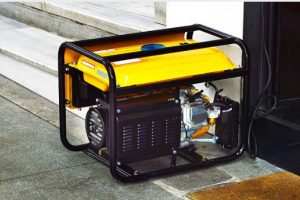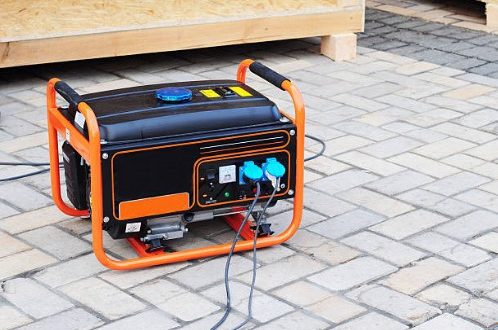Portable power is a real issue for Reno residents, as it is for everyone who lives in the Truckee Meadows. The area is famous for camping, whether for out-of-towners escaping the big city or locals, where the outdoors is part of our lifestyle. Tourists might need a generator to preserve at least a few of the luxuries of home. Let’s face it, it’s great to know how to start a fire rubbing a couple of sticks together, but it does get tedious.
Power issues are more serious for locals who have experience with snow, even fire, and the power outages that can occur. Remember the end of March? 4000 homes lost power.
For some, a portable generator isn’t a recreational tool, it’s a home defense system. But before buying a portable generator, there are a few things to consider.
Size and Weight
 First, choosing the right generator size is crucial. A generator meant to be a backup power source for your home could weigh about 50 lbs., generating 4,000 to 6,000 watts. Those who are trying to “live off the grid” should be aware that even these hefty devices aren’t designed for long-term use. They’re fine for essential home power during a blackout.
First, choosing the right generator size is crucial. A generator meant to be a backup power source for your home could weigh about 50 lbs., generating 4,000 to 6,000 watts. Those who are trying to “live off the grid” should be aware that even these hefty devices aren’t designed for long-term use. They’re fine for essential home power during a blackout.
A 50 lb. generator is going to be heavier than many people will want to take camping with them. They may need a smaller generator, which will be enough to power small appliances, light, power tools, and a TV.
Noise
Unlike the power that flows into your home from NV Energy, portable generators are noisy. Factor this in when buying a portable generator for home use. Some models are louder than others, and there’s no use sacrificing a good night’s sleep to keep the lights on.
When shopping, consider anything below 75 dBA to be reasonably quiet. Noise considerations will also determine where you’ll want to locate the generator. Try to keep it as far away from the house, and as far away from any bedrooms, as possible. Never keep it indoors as they emit carbon-dioxide.
Fuel and Running Time
A small model can hold around five gallons of fuel. This provides a running time of approximately seven hours, depending upon the model and the fuel. These factors can influence fuel consumption. Some expensive models are efficient in their consumption, generating power for hours even on one gallon.
Most generators run on gasoline, but there are those that run on propane. There are others capable of using natural gas for fuel as well. Generators that run on natural gas can hook up to your home’s gas line, which is very convenient. That advantage, though, does come at the cost of portability.
Durability and Maintenance
A generator is typically a tool that sits for long periods between use, but when you need it, it must be reliable. Be certain to familiarize yourself with your model’s maintenance requirements. Know how and when to change the oil perform maintenance. You can make it easier for yourself by finding a model with some self-diagnostic capability. Study which models need constant maintenance and which need less. Look into models that have a solid metal body. These won’t dent or break easily.
Safety and Regulations
Safety is the final issue in our guide to buying a portable generator. First and foremost, never operate portable generators indoors for the same reason you wouldn’t run your automobile indoors: deadly carbon monoxide fumes. This is common sense, but it’s easy to forget common sense in a power outage. The best generator for home use is one you are familiar with. The manufacturer will always provide an operating manual with instructions. Read it and follow it carefully. Moreover, expertise in mobile small engine repair is available.
Buying a portable generator helps prepare your family for an emergency that can come at any time. That’s the nature of our weather here in scenic Reno! We take the bad with the good. With a little preparation, you’ll get through fine. Feel free to contact us with questions about particular models, local regulations, and more. Remember that when trouble comes, you’re not alone.
We began this article by making a distinction between a generator for camping and portable generator for home use. But if you do it right, you can turn the next power emergency into your family’s next camping trip. It sure beats being stuck with a bunch of candles, doesn’t it?























